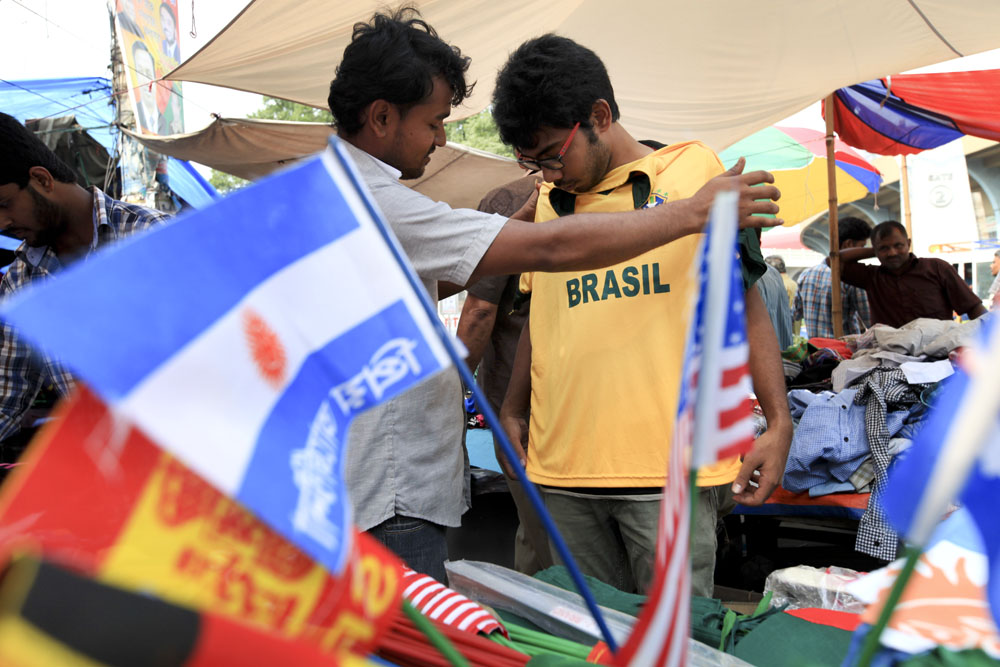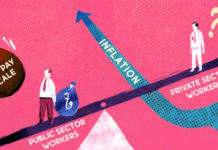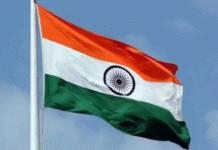Samia R. Karim
“Now that it’s done, I am glad it’s over.”
The World Cup is done and the madness is over for the next four years as Bangladesh went through two painful defeats which devastated the fans as much as any national defeat. Neymar, Messi, and the rest were brought down by the German soccer machine leaving no doubt that charisma alone could never be enough. Maybe once but not anymore. For Bangladesh, holding on to a passionate belief that reality was not as important as hope, they lie crushed. But for now they can forget the Cup and go about their business without worrying about the high octane political-economy of the international soccer world. But for a few weeks the world and we were one. Hail Argentina, Hail Brazil and if you don’t mind, Hail to us!
* * *
For those who saw Maradonna’s great goal, perhaps the greatest goal of them all, then they have seen one of the unique sports moments of all time. There was the super legend Pele and many other names but all that happened before instant sports were on the menu and that changed everything. So many saw with their own eyes Maradonna go past several defenders and score right after fisting a ball in. The infamous “Hand of God” was forgotten and a legend was born. As the commentator said, on TV the next day, “Many years later, those who saw the goal will say I was there when it happened. I saw the miracle.” In a moment, football itself became something special.
* * *
It was around this time that the great rivalry was born on the streets of Dhaka. Once upon a time all the fans belonged to Brazil but that changed when Argentina began to climb up. The original rivalry between Brazilian flair and European discipline was sidelined with the Brazil-Argentine clashes. Globally, it’s also about the style of the game and approach to it, but in Bangladesh, it’s a more local version where the reasons behind supporting two national teams from far away with the same fanaticism as one would one’s own flag is unusual. Perhaps the answer is not easy to find either.
* * *
Of course there are no teams anywhere in our region but even Asia doesn’t look too good and we don’t even know who is doing what. Japan plays, Korea plays but almost invisibly to us. Iran plays but they are in the news for nuclear activities not sports. Saudis are good for work and Hajj but not games. And where is Algeria anyway? So our support doesn’t go beyond the electronic roads of TV coverage. And that’s how the support base grows and develops. So depending on who we watch and in which league, our familiarity for the star is born.
* * *
The English Premier League (EPL), Bundesliga, La Liga, etc are where the superstars play and that’s where the eyes are glued of all supporters. Suarez used to play for Liverpool where he bit a player and now has been sold to Barca where Messi and Neymar play in the La Liga. Spain itself did terribly but it’s in their League where many of the greatest play. Bundesliga produced the champion and the Germans have shown that class is not in the individual brilliance but the collective strength of a team which plays like one.
* * *
And that’s exactly what is interesting because most Bangladeshis do not support the team but the individual stars in them. In some extreme cases it’s just one star like Neymar and Messi. So the support is about supporting a god in the pantheon and the Pir on the green. He is given mysterious powers of survival and success and everyone knows that if he does well, everyone will. The person, the player becomes the source of collective aspirations and corporate dreams. It’s no longer about soccer, it’s about us and our identity.
* * *
What was very interesting was the debate on hoisting of flags on Dhaka balconies. When Pakistani flags were raised in the Dhaka stadium by some cricket fans there was an outcry and everyone got involved. Ultimately, such flag waving was banned and in fact there is a law which says no foreign flags can be flown without specific permission. However, once the World Cup season arrived all reticence went to the winds and the city was split along Brazil-Argentina lines. And in fact, the PM personally intervened and said that there was nothing wrong in this. This double standards was possible because Pakistan was politics while the two Latin flags had none attached to its wings. Safe flags one may say compared to the complex political meanings of supporting Pakistan, wherever that may be.
* * *
But what really suits us is the near hysterical support we have for the teams. Facebook has added to that as many battles are fought on its pages and in new ways and it has allowed soccer enmity to rise to new levels, fuelling even greater rivalries. No doubt had there been less traffic jams this battle could go down to the barricades as it almost did when the rivalry was born by the ultimate political method, competing processions.
* * *
Global media creates teams and stars and lays the foundation of such international rivalries. Without TV no such pleasure, conflict and madness would exist. So, that is the first step. It’s followed by our lack of significant success in any arena of sports which is a key part of any national life. So we transfer through our support for Argentina and Brazil and become them. The great and glorious game is no longer played between two foreign teams but two versions of our own selves. We slip our skins and become as magical as the team members and in doing so we reach a new place, a new space and the ragged identity is replaced by a shiny one. And in doing so we are caught in this divine madness that makes football the greatest sporting madness of them all.
Goodbye, World Cup. See you four years from now. We shall probably never reach there but we shall always be with the teams.
————————————
Samia R. Karim is a professor of politics and policy. She is also an avid football fan.
Source: bdnews24










